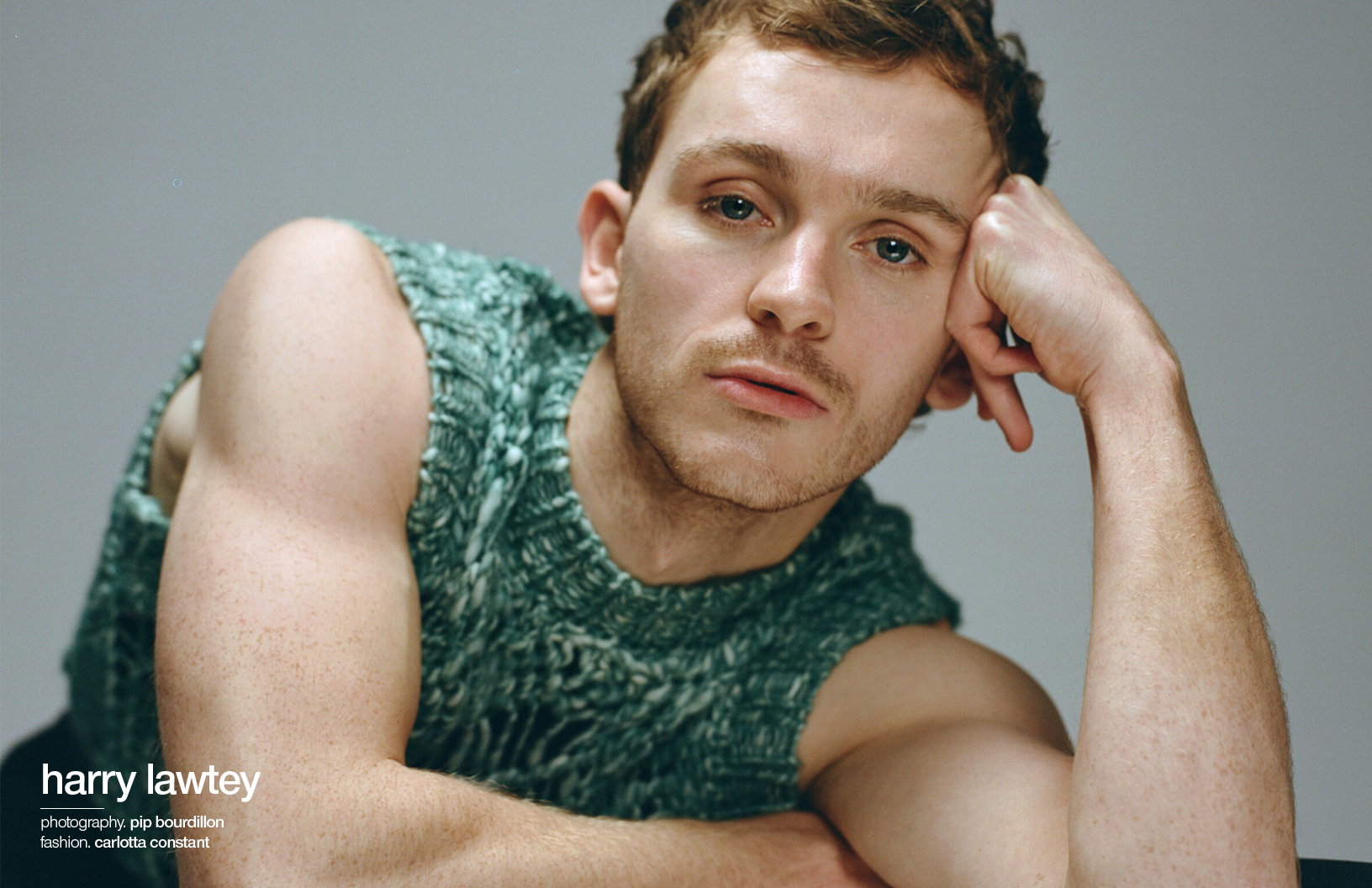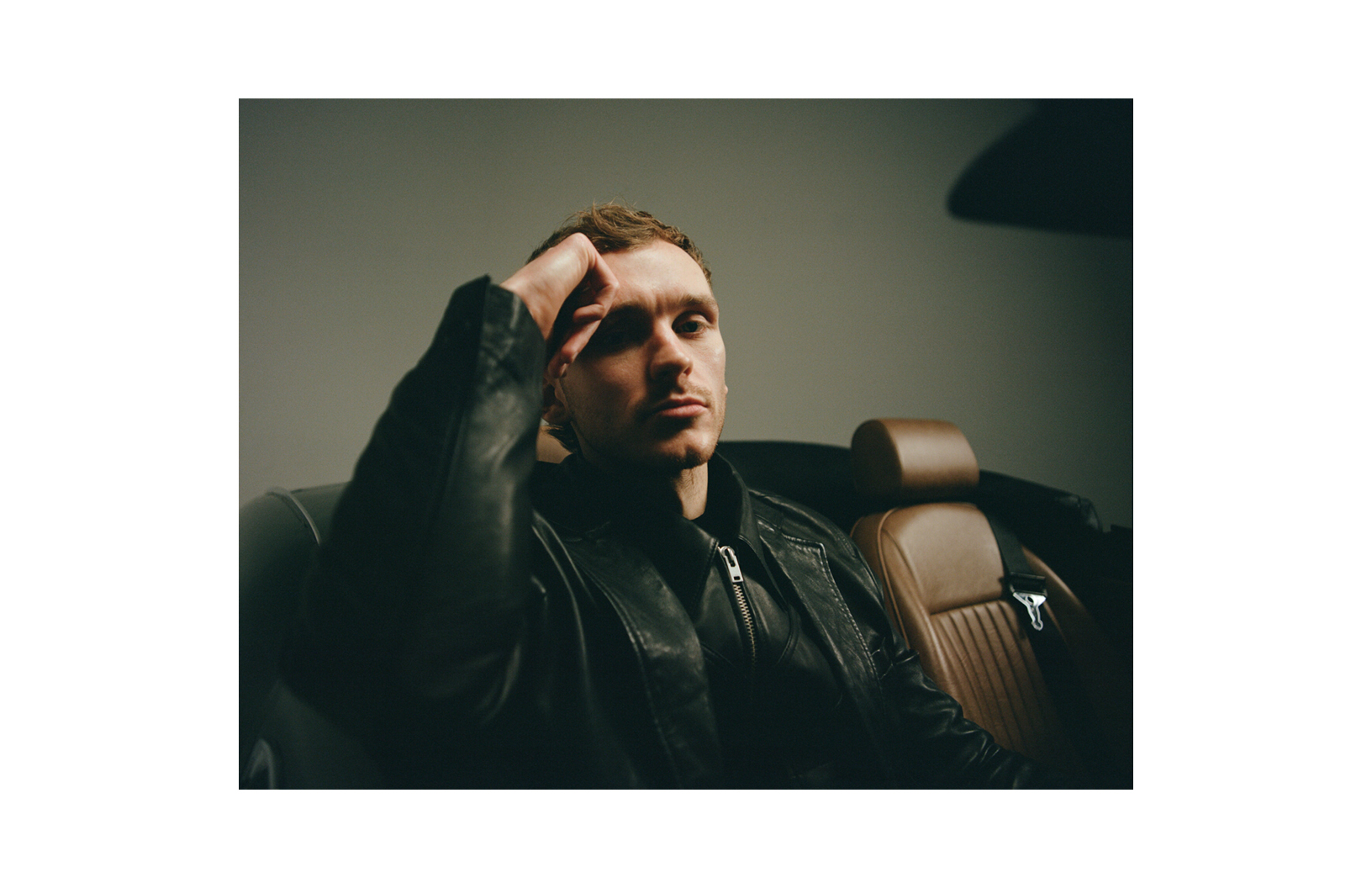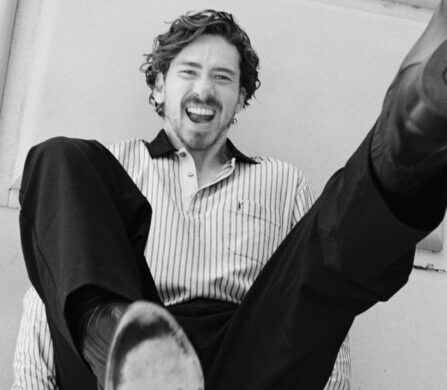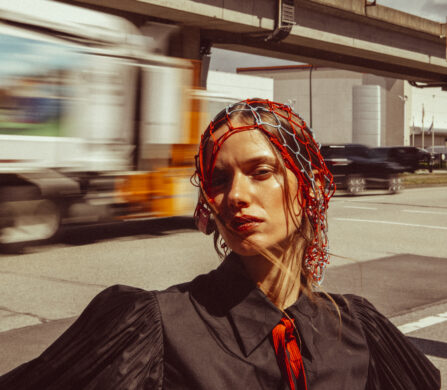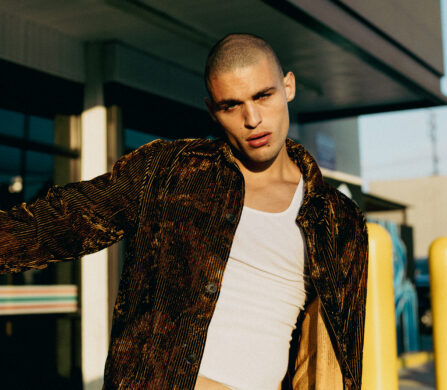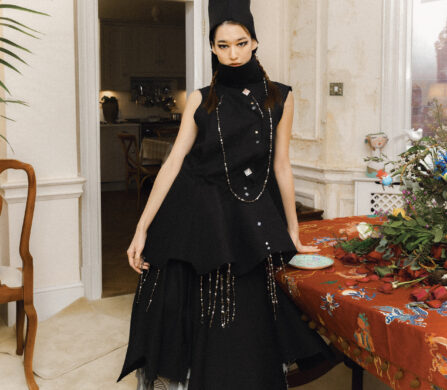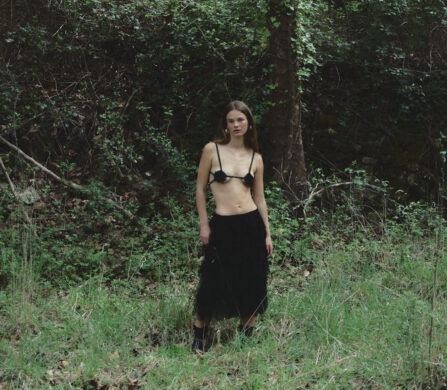Harry Lawtey wants it to be known: he is just as surprised as you are that he’s working with Christian Bale. So much so that, while on set for his new film The Pale Blue Eye, there were moments where his inner teen — the one who spent time with his mates in school watching Bale’s films and discussing them together — would rise to the surface. “There’s a very childish part of your brain that will go, ‘Shit, that’s Christian Bale. What the hell are you even doing here?’ It’s then when I have to kind of quiet it down a bit, but not lose it completely. Part of that childish joy is why I like going to work. I don’t ever intend to lose that, really.”
That childlike joy has been the catalyst to Harry Lawtey’s career. After roles on shows like Marcella and films like Benediction, the actor’s big break came with the role of Robert Spearing in the critically acclaimed financial drama Industry that premiered at the end of 2020 amid the pandemic. But before all of that, Lawtey was just a 13-year-old kid that found his calling in school. “I honestly couldn’t tell you where it came from,” he explains. “I think… I was just very lucky in the sense — and I do think it’s luck — that by happenstance I found the thing I really wanted to do and I accidentally found it at school in a way that was genuinely fortunate. I think so many other people can reach their early to mid-twenties and not sure where their life is leading because they haven’t been confronted by the thing that they want. For me, that happened at 13.”
Coming of age means something different for everyone. For Lawtey, it meant opting to leave his family at 13 and moving 2,000 miles away to attend theatre school and live with four other young boys with a host family. “I just had a very firm belief to do this now,” he states. “It didn’t necessarily feel exciting; it felt intimidating and it felt daunting. But I knew it was the thing that was going to, at least for a certain period of time, change the course of my life and it continued to do that. I genuinely don’t think I’d be doing any of this stuff now if it wasn’t for that decision.”
It’s a decision that some can’t even make when they enter adulthood due to a mix of doubt, fear, and anxiety, a fact I point out to him. “I wouldn’t have said that I was a fearless 13 year old,” he says. “I think I had my fair share of anxiety like any kid that age, but I definitely think you’re right — you do have a certain sort of bullishness when you’re that age and you do feel like the concept of risk is a lot less tangible for you. You do feel a bit more indestructible and I definitely realised that looking back, that when I got to London, my parents used to be terrified because they knew that I was walking home at night back to the place that I was staying and just walking through this big city they didn’t really know. I kind of just had a puffed out chest, like, ‘Oh, I’ll just find my way around. I belong here now and this is where I am and I’ll get to know it.’ I definitely wasn’t aware of how vulnerable I was at that time. You do have a certain confidence at that age that is maybe enviable now because once you grow up, you get a reality check.”
When we speak, it’s a few weeks after the announcement of Lawtey’s casting in the highly anticipated Joker sequel, Joker: Folie à Deux. Despite his role being kept under tight wraps, it’s a testament to where Lawtey is at in his career — currently Hollywood’s best-kept secret but on the verge of becoming a household name. After a decade of diving into projects across theatre and the screen, it’s only now that he feels he has the perspective to see how much he’s grown. “It sounds slightly cliche, but I think you’re constantly evolving,” he ponders. “You might only really notice after it’s already happened, like a day will come and you’ll realise you’ve done something and you go, ‘Ah, that’s a big improvement or a big lesson.’ Acting is a really ephemeral thing; it’s not a binary craft. It’s based on feeling a lot of time, I suppose, and how other people interpret what you do.”
If exploring his feelings is how Lawtey determines his growth from project to project, there is a direct link to that aforementioned childlike joy found while watching Bale films as a kid and his latest project: Netflix’s 1800s murder mystery, The Pale Blue Eye. The film stars Christian Bale who plays Augustus Landor, a detective who investigates several murders within the United States Military Academy. His sidekick? Edgar Allan Poe, a young military cadet. Lawtey plays the punchy and cocky cadet Artemis Marquis, a character that is the embodiment of the saying ‘more than what meets the eye.’ When prompted with what advice he’d give his character, if given the chance Lawtey would encourage Artemis to do one very important thing. “He should get some therapy,” he chuckles. “From the modern day, it’s probably universal for any period of time. But especially between 18 and 30, you could probably say, ‘you know what guys, let’s just sit down in a room, have a chat, get it all off our chest.’ I think you could probably say that to every character in the film, literally.”
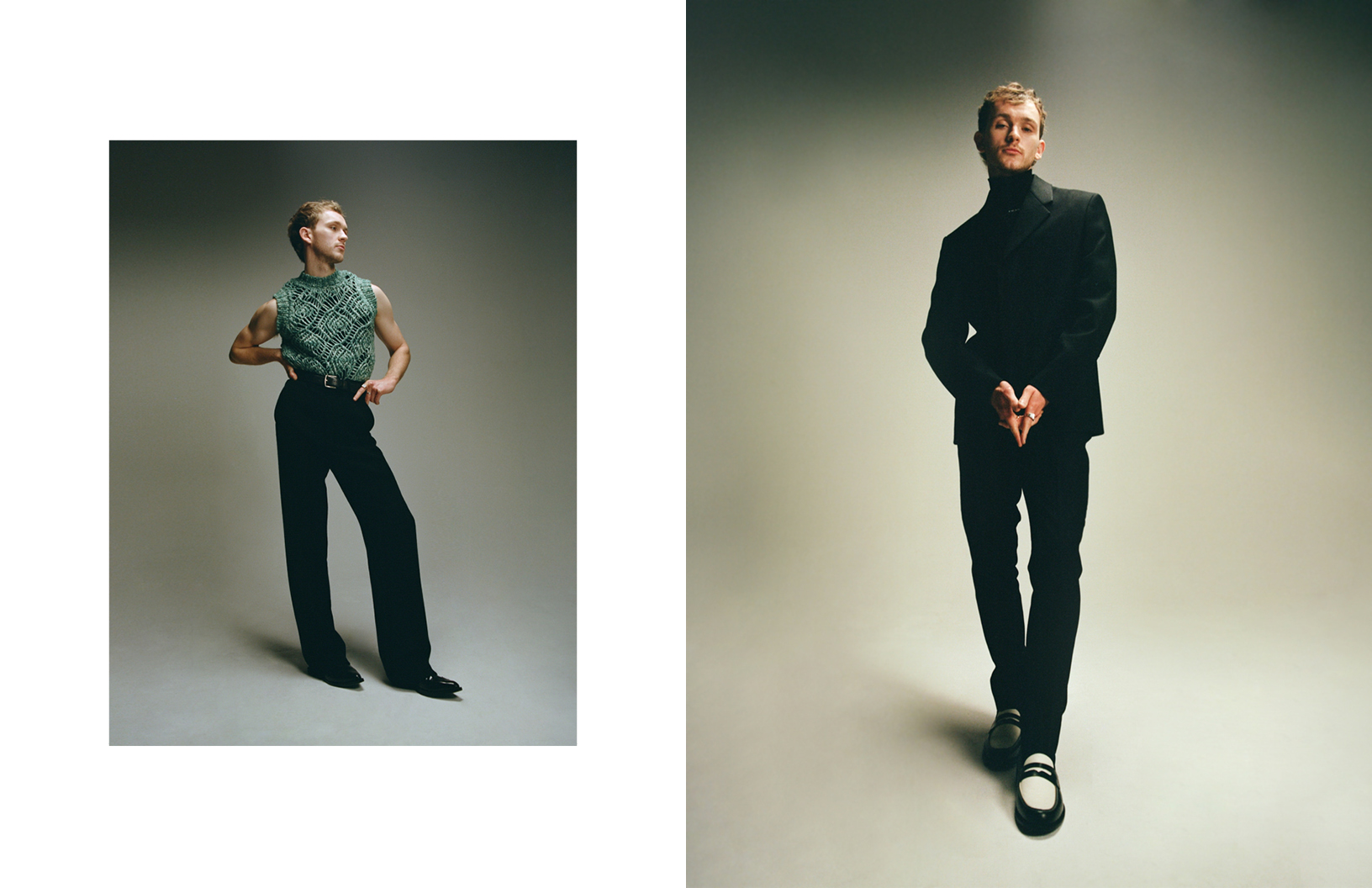
vest. Namacheko
trousers. Casablanca
boots. Jimmy Choo
belt. Stylist’s Own
rings. Bleue Burnham
opposite
full look. Prada
shoes. Duke & Dexter
rings. Bleue Burnham
socks. London Sock Co
The Pale Blue Eye will forever be the project that brought Lawtey properly to America for the very first time. “I’d barely ever been to America before this film, so the first week of January I took a flight out to Pittsburgh, it was minus five degrees, still slightly in a hazy sort of pandemic world, and suddenly I’m on like the other side but in a place I’ve never been meeting new people every day and really enjoying the work. There was a pinch of impostor syndrome while having that real thrill of being so excited to be here and do this thing. The character I found really exciting to play; it felt like a step into something a little different for me.”
Aside working with Bale, what attracted Lawtey the most to The Pale Blue Eye is its ability to lean into multiple tropes at once while still existing as its standalone idea. “It knows its tone and sits in it, welcoming you into the story in a really great way,” he explains, musing about the script feeling dark, gothic, and quite luxurious. “There’s different components to it and it’s very well written. Some of the language is really kind of florid and eloquent. If you’re going to get a good language like that, then you’d better get a good actors to say it.”
In a way that is equal parts selfish and smart, Lawtey sees projects like The Pale Blue Eye and Industry as a chance to learn from others. “I think I’m kind of constantly getting better; that’s the goal, that’s what I try to do. I think the biggest thing for me is working with people that I admire. One of my favourite parts of the job is getting to work with more experienced actors and get to know them as people, but it’s really to study them. There’s no better way to learn from an actor than acting up to them and seeing it close up in 3D. That’s been a great pleasure over the last four years of my career, really, is that I’ve started to work with actors that have brilliant careers and people that I’ve watched since I was a kid. That’s been the real ‘pinch yourself’ moment of it.”
For him, the biggest lesson he’s learned while on-set is that there is no right or wrong, one-size-fits-all approach with acting. “Sometimes you find yourself in a scene and you get a glimpse into someone’s process and their method of working,” he explains. “I’ve often been in scenarios, like in The Pale Blue Eye, where you’re in the middle of a scene and you break between takes and you realise that there’s two incredibly experienced, successful, brilliant actors and they’re doing like the complete opposite thing. It’s a process belongs to you and you have to do whatever you feel works best as long as it’s in service of the project. You’ve got these amazing actors and they’re all doing it differently, yet they’re able to coexist. There’s no atypical great actor; there’s very many different kinds and that’s quite a cool thing.”
Acting has more or less been Lawtey’s school playground; it’s a constant lesson, over and over, in learning and relearning one’s craft. When I suggest the comparison between school and acting, he laughs. “It’s funny you say that, I’ve used school as an analogy for sets all the time. What you see is that kind of learning element and different personalities and teachers, and you respond to different people in different ways and you get inspired and captivated by certain characters. I really loved being at school as a kid. It wasn’t that I was bookish or whatever, I just liked the environment. I like being around like 20 kids in a class and you do a bit of work, you learn something and then you kind of be a bit silly and mess around and have a laugh. If that’s what you are drawn to, then a film set is like the best place in the world because it’s exactly that.”
When chatting with him it’s clear Lawtey is as self-deprecating as they come, but also incredibly aware just how lucky he is to be working in an industry that can be fickle. “I worry I’ll actually sound very self-aggrandizing because don’t get me wrong, it’s a really stupid job,” he jokes. “It’s a completely stupid job and it’s very silly and no one should pay any kind of huge reverence to it, it’s a thing that has a place but it’s very silly. But I do feel, like you say, there’s a joy and imagination that kids just have for free that probably most actors just didn’t really want to let go. I think that’s why I became an actor — so you never have to leave school. I sound like Peter Pan because it’s a bit like never growing up, but that is probably why most actors act.”
Outside of Industry and The Pale Blue Eye, Lawtey’s upcoming filmography is as varied and expansive as ever. He just finished shooting the ITV romantic comedy-drama mini-series You & Me out later this year, Joker: Folie à Deux is in production for a 2024 release, and there are a number of other projects on the way. When I bring up his ability to dance between genres and curate a filmography that differs from project to project (“That is the goal in many ways”), he uses it as another reminder of just how lucky he is. “Things might look like very curated decisions, but often actors don’t actually have that privilege — first and foremost the goal is to be a working actor. If you’re in the tiny percentile of actors who are able to work for a living, then you’re very lucky. You jump at whatever comes your way and if there’s some variety to that, then great. I feel like I might now be in a place where I might be moving into a space where I have a bit more autonomy about what I do next and the luxury of choice, I suppose. That’s why acting is fun; you get a different gig with different people, different scenarios and different genres. It’s what makes you feel like you’re doing your hobby for a job.”
As our chat draws to a close and we’ve touched on all projects past and present, there’s only one other thing I want to know: what Harry Lawtey wants to manifest in 2023. His answer is simple: just happiness. “That should always be the goal,” he says. “When you say manifest, I don’t think you can necessarily generate that it comes to you rather than chasing it but that’s always what I hope for. I just hope to have a nice time with nice people and be happy.” For Harry Lawtey, it really all comes back to finding that childish joy.
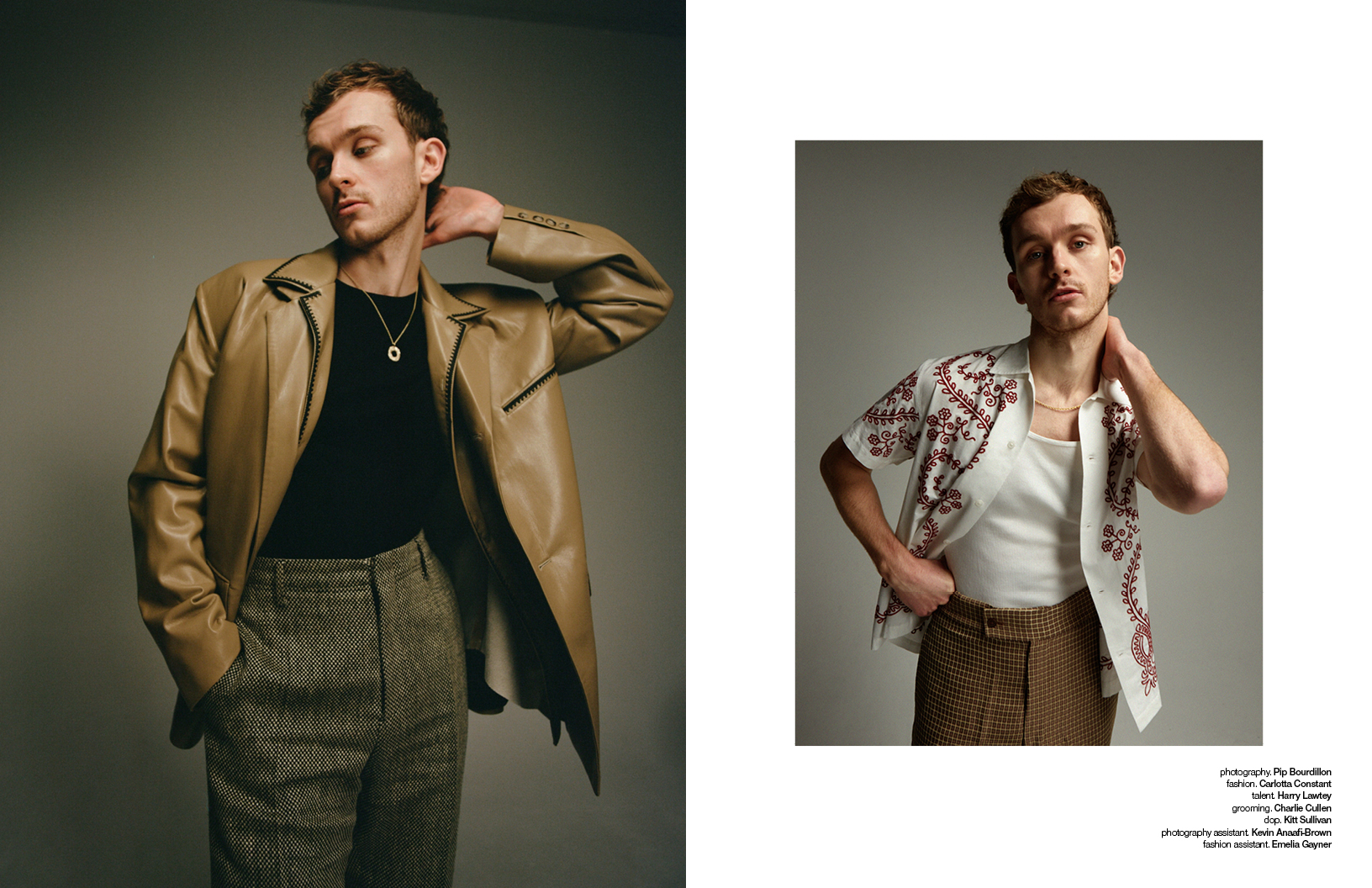
full look. Nanushka
necklace. Bleue Burnham
opposite
shirt. Bode
tank top. Calvin Klein
trousers. Nanushka
necklace. Chained & Able
rings. Bleue Burnham
The Pale Blue Eye is out now on Netflix.
photography. Pip Bourdillon
fashion. Carlotta Constant
talent. Harry Lawtey
grooming. Charlie Cullen
dop. Kitt Sullivan
photography assistant. Kevin Anaafi-Brown
fashion assistant. Emelia Gayner
words. Kelsey Barnes


Schön! Magazine is now available in print at Amazon,
as ebook download + on any mobile device












